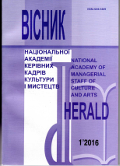POLEMIC THOUGHTS OF MYKOLA VORONYI ABOUT CRISIS OF A NOVICE NON-SPIRITUAL IDEOLOGY OF EUROPEAN ARTS IN XIX – XX
DOI:
https://doi.org/10.32461/2226-3209.1.2016.138475Keywords:
Mykola Voronyi, a non-spiritual ideology crisis, modernism, Europeanization of a Ukrainian stage,Abstract
n this article, it is attempted to analyse polemical thoughts of an outstanding figure of the Ukrainian theatre oflate 19th – early 20th centuries, Mykola Kindratovych Voronyi, about the crisis of a non-spiritual ideology of the Europeanarts of that time, when the almighty materialism did prevail over the defenseless idealism.Very superficial facts are known about the artist’s theatrical activity. Many of his archival materials have notbeen analysed yet because of objective inaccessibility, and researchers are primarily interested in his poetic andtranslation works. In this article, the author analyses only a certain aspect of his theatrical and cultural heritage.The activity of Mykola Voronyi as a theatre critic, historian and theorist is very fruitful. His artistic-aesthetic andsocio-historical views are extremely different, since he aimed to form a new versatile Ukrainian national theatre. Mykola’sidea to Europeanize the theatre is polemical extraordinary and extremely important. The sporadicity of his views enabled
him to feel the world theatrical process very subtly.So, what is the crisis of the European art, which has created modernism as a phenomenon? What is thepurpose of theatre? How does a theatre influence on viewers? Should art be biased? Should art be created for art’ssake? And the most important if it is possible to overcome the crisis of the humanity’s consciousness. These are thequestions which the author tries to answer in this article.
Downloads
Published
Issue
Section
License
Authors who publish with this journal agree to the following terms:
1. Authors retain copyright and grant the journal right of first publication with the work simultaneously licensed under a Creative Commons Attribution License International CC-BY that allows others to share the work with an acknowledgement of the work's authorship and initial publication in this journal.
2. Authors are able to enter into separate, additional contractual arrangements for the non-exclusive distribution of the journal's published version of the work (e.g., post it to an institutional repository or publish it in a book), with an acknowledgement of its initial publication in this journal.
3. Authors are permitted and encouraged to post their work online (e.g., in institutional repositories or on their website) prior to and during the submission process, as it can lead to productive exchanges, as well as earlier and greater citation of published work (See The Effect of Open Access).


